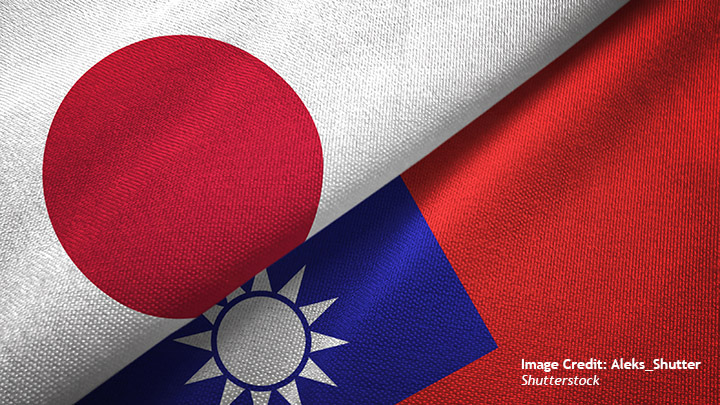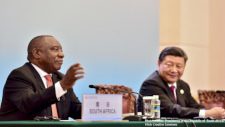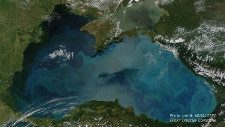Taiwan-Japan (Unofficial) Relations: In a Sea of Troubles

Niklas Swanström and Lea Heck
Introduction
Taiwan (The Republic of China, ROC)* and Japan have had a long and vacillating history of engagement mostly consisting of peaceful periods of cooperation yet beset by the Japanese colonial rule of Taiwan from 1895-1945 as well as the atrocities committed during the Second World War. The Taiwan-Japan relationship is a complex one unequivocally entwined with China (The People’s Republic of China, PRC), a country which has been trying to drive a wedge between them. Overall Taiwan-Japan relations remain positive, although they are both constrained by a reluctance to provoke China, which arguably is the single most important external actor in the bilateral relationship. This paper aims to take a closer look at the history of the bilateral and trilateral relations between the states mentioned and to examine in which way China has, and will continue to, influence relations between Taiwan and Japan.
With the reelection of Tsai Ing-wen in 2020, Taipei has taken another step towards a more distanced relationship to the Mainland. The perception of Chinese efforts to undermine the rights provided to Hong Kong under the “one country, two systems” principle during the demonstrations against the extradition legislation, spurred anti-Chinese sentiments in Taiwan and translated into increased popular support for Tsai’s Democratic Progressive Party (DPP). Taiwanese companies have already begun a gradual exodus from China and have started to reallocate their financial capital towards investments in Southeast Asia, Japan and elsewhere. The Covid-19 pandemic has accelerated this process and Taiwan is increasing its engagement with states outside of Chinas influence, not least Japan.
Diplomatically Taipei has been under enormous pressure from Beijing, which has targeted Taiwan’s remaining diplomatic allies. This has caused the numbers of states that continue to recognize Taiwan as the government of the Republic of China (ROC) to dwindle from 22 to 15 since 2016. Nevertheless, Taipei has been able to develop quasi diplomatic relations with other states, including Japan, that stop short of a recognition of statehood and thus do not violate the One China Principle. As Beijing’s willingness to tolerate the existence of what it views as a hostile break-away province in a strategically important position diminishes, this status quo is being upended. Whether or not Tokyo and Taipei will be able (and willing) to maintain their unique relationship in the face of increased pressure will be an important determinant of future development in the region.
* To date China refuses to acknowledge Taiwan as a state and sees it as a renegade province that should be incorporated at any cost. For the purpose of this publication and reflective of the de facto situation Taiwan will be seen as a separate political entity. Most states adhere to the ‘One China policy’ which precludes diplomatic relations of a third state with both PRC and RoC. At present only 15 states continue a diplomatic relations with Taipei.
Colonialism and Diverging Paths with China
The period of Japanese imperial rule over Taiwan from 1895 to 1945 has impacts that reach far into the present. After the Qing dynasty’s defeat in the Sino-Japanese War of 1895 and the signing of the Treaty of Shimonoseki, Taiwan became a Japanese colony. The occupation of Taiwan is today, among segments of society, seen as being less brutal than Japanese imperial rule over Korea and China. Even though Japan’s colonial rule was characterized by violence against the island’s population and suppression of any opposition, Japan’s imperial administration invested in civil infrastructure and basic education, as well as public health, which a lot of Taiwanese citizens profited from – despite lacking political autonomy. Former ROC president Lee Teng-hui even regarded Japanese rule over Taiwan as a positive episode for the country, a sentiment shared especially by younger generations that have no direct memory of the colonial period. However, the question is still a dividing matter.
With the San Francisco Peace Treaty of 1951 and the Treaty of Peace between Japan and the Republic of China (Taiwan) of 1952, Japan officially gave up all claims left upon Taiwan. Following this, Japan followed the U.S. lead and oriented its political actions along a two-China policy, creating a strong relationship with Taiwan. Still the Japanese government kept in mind that China was a valuable partner in matters like post-war recovery. This coupled with pressure from the People’s Republic of China (China) – which refused to engage in diplomatic relations with countries who would not accept its policy – led the Japanese government to the decision to adapt to the so called “one-China” policy in 1972. As a consequence, Japan can only acknowledge one sovereign state and government under the name “China”. This is an important aspect of the trilateral relationship between Japan, Taiwan and China and shapes the relationship between Japan and Taiwan until this day.
Still, Japan has maintained strong albeit unofficial and non-governmental ties with Taiwan, establishing the Interchange Association in Taiwan, a de facto embassy. Taiwan followed suit by founding the Association of East Asian Relations. In January 2017, the two ersatz embassies were renamed into “the Japan-Taiwan Exchange Association” and “the Taiwan-Japan Relations Association” respectively, attracting vehement criticism from China.
In 1998, China and Japan signed a joint declaration, which among other things stated that Tokyo would remain in line with the PRC regarding the “one-China” policy and keep political ties with Taiwan on an unofficial level. However, Japan also exempted Taiwanese residents from having to obtain visas for visits of 90 days or less in September 2005. After a cool down of the Japanese-Taiwanese relations following the election of pro-China President Ma Ying-jeou in 2008, the Taiwanese society made record donations to help Japan rebuild after the Great East Japan Earthquake in 2011. This strengthened ties between Japan and Taiwan greatly and a “Thank You Taiwan” movement echoed throughout Japan. But the earthquake and the ensuing nuclear catastrophe also resulted in a ban of produce from the affected regions. Due to fears of contamination in Taiwan this ban is still in effect and has been the cause of tension and heated discussions.
A key security issue that has not been resolved until this day is the ownership of the Senkaku/Diaoyu Islands. Japan – which oversees administrative control – as well as Taiwan and China claim that they are a part of the respective countries. In addition to the conflict around the Senkaku/Diaoyutai Islands there is an ongoing dispute about the uninhabited coral reef of Okinotorishima, thousand miles south of Japan’s main islands and east of Taiwan. Yet Japan and Taiwan have been able to set aside such issues to continue bilateral relations. For example, in 2011 the two countries signed an open skies agreement with the goal to liberalize bilateral commercial aviation exchanges and increase tourism. Progress could also be seen in April 2013, as Taipei and Tokyo signed a fishing treaty “while avoiding the sovereignty issue surrounding the Senkaku Islands.” This treaty was mostly made possible because Beijing did not voice strong opposition to Ma’s diplomatic policies. Before the general election in 2016, then presidential candidate Tsai Ing-wen went on a four-day trip to Japan, dubbed the “Taiwan-Japan friendship” tour during which she allegedly met Shinzo Abe. Her election in January 2016 created a solid foundation for further rapprochement.
Improved Relations Under Shinzo Abe and Tsai Ing-wen
Upon the election of Tsai as President of the ROC in January of 2016, Abe and then-Foreign Minister Fumio Kishida extended unprecedented congratulatory messages. While they referred to Taiwan as an important partner with shared values they still emphasized that the cooperation was to take place on a non-governmental level. Two days after Tsai’s election, Chief Cabinet Secretary Yoshihide Suga expressed support for Taiwan to join the Trans-Pacific Partnership (TPP) which was a step towards further improved relations. While the TPP did not come into being, it was succeeded by the Comprehensive and Progressive Agreement for Trans-Pacific Partnership (CPTPP), consisting of 11 Asian countries. While Taiwan wants to join, it would have to liberalize its import and export restrictions to do so. Japan’s continued support for Taiwanese participation in the CPTPP puts a strain on the Sino-Japanese relations, as Beijing views this as a violation of its “one-China policy”.
In October 2016, the relationship seemed to further improve with the inaugural maritime cooperation dialogue between Japan and Taiwan, during which the countries agreed to cooperate on maritime issues like fisheries, research and coast guard cooperation among many other areas. The initiation of a dialogue was followed by the signing of a memorandum of understanding (MOU) between Japan and Taiwan in 2017, which allowed for ships or coast guard staff from either side to approach and operate near the Okinotorishima atoll in the event of an emergency. due to the disputed status of Okinotorishima this agreement constituted a breakthrough of sorts.
The frequent passing of Chinese ships through the south and north-east of Taiwan, the introduction of new Chinese weapons, and the beginning of sea trials of China’s second aircraft carrier in May 2018, alarmed both Taipei and Tokyo. Shortly afterwards Japan’s former Maritime Self-Defense-Force chief of staff, Tomohisa Takei pledged to strengthen military ties between Japan and Taiwan. Additionally, former Taiwan president Lee Teng-hui expressed his wish “for the two countries to promote exchanges and cooperation for their common defense” during a visit at the Japan-Taiwan Peace Foundation.
In early 2019, Chinese coast guard vessels were sighted close to the Senkaku Islands, only days before talks in Tokyo about fishing rights were set to begin with Taipei. The presence of Chinese warships in the disputed area was seen as a warning to both Taiwan and Japan. In May 2019, Japan’s Foreign Minister Taro Kono publicly supported Taiwan’s bid to attend the World Health Assembly as an observer on Twitter. Taipei appreciated this gesture and President Tsai stressed the importance of Japanese-Taiwanese cooperation, as well as the country’s positive attitude towards Japan. Maintaining close ties is all the more important for Taiwan given the signs of a gradual improvement in relations between Tokyo and Beijing. For example, for the first time in eight years Japan and China took part in a joint warship drill in October 2019.
In her re-election bid in January 2020, Tsai won 57 percent of the popular vote, setting a record for votes in Taiwan. While Tsai campaigned for Taiwan to be less economically dependent on China, which remains Taiwan’s largest trading partner, her Kuomintang opponent, Han Kuo-yu – viewed by many as harboring a pro-Beijing attitude – secured only 39 percent of the vote. While the Chinese government viewed this development with displeasure and claimed that the election was externally manipulated, it seems like the tactical decision by China to threaten and pressure Taiwan until it decided to become a part of China backfired. Tokyo by contrast welcomed Tsai’s reelection and Foreign Minister Toshimitsu Motegi congratulated Taiwan on a “smooth implementation of the democratic election” and Ms. Tsai on her victory again. “Taiwan is an important partner and a precious friend of Japan, and we share basic values and enjoy close economic relationship and people to people exchange,” Motegi said. And on January 17, 2020, Keiji Furuya, a member of the Japanese Diet delivered congratulatory messages from Prime Minister Abe.
Balking at the DPP’s inclinations towards Taiwanese independence, Beijing has not been shy in making its stance on the matter clear. The Chinese armed forces have been known to enter Taiwan’s air and sea space on multiple occasions, the number of times significantly increasing after 2016 with the result that the ROC armed forces stopped publicising individual incidents of incursion in 2017. While the People’s Liberation Army (PLA) navy and air force sorties refrain from kinetic action, these strategic maneuvers signal that Beijing rejects the notion of Taiwanese sovereignty and will not tolerate efforts to separate from the Mainland. While there has been a long precedent of this kind of political and military tension, pressure has increased since Tsai’s election in 2016 and has further intensified since she was reelected.
The COVID-19 pandemic has further soured relations between China and Taiwan, who accuse each other of spreading fake news. Taiwan-Japanese relations have improved, not least due to Japanese (and U.S.) backing of Taiwan to enter WHO, which is currently blocked by Beijing. Taiwan has received a great deal of sympathy in Japan both because of Chinese pressure but also for its successful management of the outbreak. Despite being geographically close to China where the virus originated, Taiwan is only ranked 123rd out of 183 countries by the number of confirmed cases per million people. Japan and Taiwan have agreed to increase their cooperation in the face of the COVID-19 outbreak, something that has been extremely important for Taiwan. For instance, this cooperation can be seen in Taiwan’s donation of two million facemasks to Japan at the end of April. A bright red banner adorned the gigantic packages of wrapped masks stating, “Taiwan can help”.
What Does the Future Hold for Taiwan-Japan Relations?
There are several trends in the Taiwan-Japanese relationship that will likely remain relevant for the future. The Japanese government is sure to continue a careful balancing act of not seeking to anger the PRC by having too close cooperation with Taiwan, while still trying to improve ties to Taipei. The existing agreements and promotion of bilateral relations will expand their reach, partly with their goal of a free and open Indo Pacific (FOIP) but also to counter China with a democratic defense line, that could include Taiwan. This is something Taiwan will react very positively to because they need both Japan and the support from a greater democratic “alliance”. China will likely disapprove of this as reinforcing Taiwan’s role as an independent entity in the eyes of other countries is the first step towards independence.
The coronavirus has accelerated cooperation between Japan and Taiwan, with instances such as the donation of 2 million masks by Taipei in April reflecting the Tsai administration’s willingness to actively participate in the global response to the pandemic, but also more government -to- government and research cooperation. Beijing’s approach towards Taiwan and attempts to pressure WHO to exclude Taiwan at any cost has engendered sympathy for Taipei. Strong praise in the Japanese media for Taiwan’s Minister of Audrey Tang, who has been instrumental in the response to Covid-1922 would suggest that increased cooperation in public health is in the cards for Japan and Taiwan, not least in terms of developing a vaccine and to learn from the Taiwanese experience before a second and third wave of COVID-19 affects Japan. While Beijing has strongly protested against Taiwan being included in any kind of international body predicated on “state-to-state” relations, Taipei has been attempting to increase its participation in non-military cooperation and coordination regarding humanitarian issues, areas that Japanese public sentiment is largely sympathetic.
Despite having scored diplomatic points around the world due to its effective and coherent policy in times of crisis, Taipei is cautious not to excessively provoke Beijing, at least not in the short term, and seeks to maintain the status quo as far as possible. However, this should not be read as apathy. In the inaugural address of her second term in May, Tsai reiterated her rejection of the “One China, Two Systems” model Beijing has been trying to apply to Taiwan and the ROC President recently alluded to triggering a mechanism by which special relations with Hong Kong and Macau would be suspended over the imposition of Chinese national security legislation.
During the annual Han Kuan military exercise, which each spring simulates a potential invasion from the Mainland has been postponed due to the pandemic, Taiwan’s air and naval assets routinely shadow their Mainland Chinese counterparts upon approach. Officials in Taipei are quick to point out how much they value self-sufficiency in national defense and the desire to develop strategic capabilities regionally parallels Tokyo’s efforts to refit helicopter carriers to build blue water operational capability.
Since Tsai was reelected in the beginning of 2020 it seems reasonable to conclude that her administration will continue on a foreign and defense policy course that reflects the DPP’s position that Taiwan is a distinct entity separate from Mainland China. Indeed, much as in the U.S. a second term president may be more inclined to pursue more stringent policies as the system does not allow for more than two terms. For Tokyo this means that Tsai will likely continue her government’s current trajectory, building on the mostly positive cooperation with Japan, while also attempting to increase Taiwan’s international space and security.
Given the importance that has been allocated to the Covid-19 Pandemic, the success of that will partly be dependent on how Beijing handles the critique of its own management of the Covid-19 crisis and whether Chinese officials will be willing to take a more open approach to sharing information about the virus and respond to criticism from abroad. In the case of Cross-Strait relations this means that heavy handedness on the part of China in shutting down debate or responding to praise of Taiwan engenders sympathy and support for Taipei and its democratic approach abroad.
Before the outbreak of the coronavirus Japan and China had made efforts to improve their relationship. Xi Jinping even announced that he would make an official visit Japan in 2020, which could not come to pass due to the pandemic. Should a rapprochement between Japan and China occur in the aftermath of the coronavirus induced economic recession there would be serious cause for concern for the Taiwanese government. Japan is under immense domestic pressure to improve its economic balance and China is also experiencing murmurs of discontent after experiencing its worst economic quarter in three decades.
On the one hand, this leads to a situation where there are calls for compromises between the two largest economies in the region. However, on the other hand this is a perfect opportunity to tie new partnerships and decrease Japanese (and Taiwanese) dependency on China. Prime Minister Abe will have several difficult decisions to take, including whether to re-center around China’s economic sphere or to decrease its dependency on a politically juxtaposed neighbor.
Japan is Taiwan’s third most important trading partner – only surpassed by the U.S. and China. Taiwan fears that close cooperation between China and Japan, or China and the U.S., will give Beijing the impression that it has more leverage for political action against Taipei. The pressing need to respond to the Covid-19 pandemic, however, has highlighted Taiwan’s versatility in responding to crisis to a global audience.
While the stand-off with Beijing will continue to limit Taipei’s ability to operate within the international community, potentially forming a barrier to those wishing to cooperate with it, the Taiwanese performance in these difficult times may induce many to reconsider their standoffish attitude. For Japan, which has many historical and cultural ties with the island, and shares many of its values, the relationship with Taiwan will likely continue to feature in Tokyo’s regional policy. While the future balance of the region may be opaque, the partnership between Taiwan and Japan will undoubtedly play an important role.
Related Publications
-
The Political Split at the Heart of Taiwan’s Struggle against Foreign Disinformation
Taiwan’s struggle against foreign disinformation and concerns about China’s impact on its 2024 election has received much international attention recently. This issue brief examines the domestic and international politics behind […]
-
Challenging Western Views: Understanding Power and Stability in East Asia; An Interview with DAVID C. KANG
Dr. David C. Kang is Maria Crutcher Professor of International Relations at the University of Southern California. A leading expert in East Asian security, international relations, and political economy, Dr. […]
-
Elevating Democracy via Transatlantic Collaboration
In collaboration with the U.S. Embassy in Stockholm, the Institute for Security and Development Policy (ISDP) organized a series of conference events from March 11 to 14, 2024, held in […]
-
China’s Security Engagement with Africa & The “Global South” Narrative
In recent decades, China has actively sought to position itself as a pivotal partner and emerging leader within the Global South. Despite the lack of clear consensus on the definition […]
-
China as a Black Sea Actor: An Alternate Route
China’s international role has expanded rapidly in the last decades, and the Greater Central Asian region, Europe, and the Middle East, to which the Black Sea region (BSR) connects, are […]




